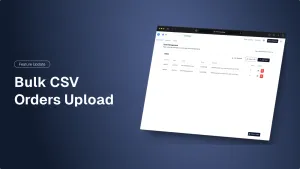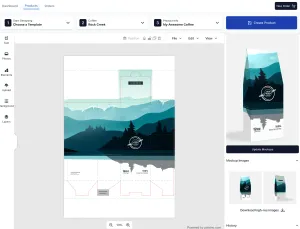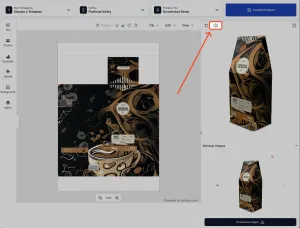Is Dropshipping Coffee Profitable? A Deep Dive into the Coffee Business Prospects!

Is Dropshipping Coffee Profitable? A Deep Dive into the Coffee Business Prospects!
Introduction
Dropshipping coffee provides an opportunity to earn passive income without handling inventory or shipping. As coffee is widely consumed daily, there is built-in demand for this product. This article will explore if operating a coffee dropshipping business can be profitable in 2023. It will outline how to source quality coffee beans from reputable suppliers, build an appealing brand, manage fulfillment, and attract customers in a crowded market. We’ll analyze the advantages and risks of running a coffee dropshipping operation, examine industry trends, and provide tips for long-term viability. If you’re considering selling coffee online through dropshipping, this guide will assess if it can generate sustainable passive income.
So is dropshipping coffee profitable? The answer is a resounding yes! But you need to set yourself up for success! That’s why Roastify has developed our completely free platform to get you up and running risk free. Check out our Dropship Coffee page to learn more.
I. Passive Income Opportunity from Coffee Dropshipping
The appeal of dropshipping is the potential to earn passive income without handling inventory or shipping orders yourself. Coffee is an exciting product to try this business model with. People love coffee and drink it daily, so there is built-in demand.
Here are some of the main benefits of coffee dropshipping:
- Low startup costs: You can launch a coffee dropshipping business without much initial investment. No need to buy any coffee upfront or rent a warehouse.
- Easy to manage: With the right coffee dropship supplier, fulfillment is handled for you. You simply drive sales and marketing.
- Flexibility: Work when you want and operate the business from anywhere with an internet connection.
- Existing demand: Coffee is a $100 billion industry and customers are actively seeking quality coffee online.
- High margins: Coffee can retail for 2-3x the wholesale cost, allowing for good profit margins.
- Recurring revenue: Many customers will subscribe for recurring deliveries of coffee. This leads to passive income.
Starting a coffee dropshipping business provides an attractive passive income opportunity with lower risks than other ecommerce models. But finding reliable suppliers and building a brand are vital for long term success.
II. Finding Reliable Coffee Dropship Suppliers
The key to any dropshipping business is finding reputable suppliers to fulfill your orders. This allows you to focus on sales and marketing. Here are tips for finding good coffee dropship suppliers:
- First and foremost, you need to make sure they sell good coffee! Make sure you taste it and make sure you know where they are getting their coffee from. You don’t want to find out that you are dealing with a middle man rather than getting fresh beans right from the source. To try Roastify’s Coffee head over here: Sample Coffee
- Check out their software system. Is it robust? Buggy? Well thought out? You will be using this system to make and track your products.
- Can they grow with you? Is it a business set up for demand? Or will they stumble when big orders start rolling in?
These are some good questions to ask when you are looking at your coffee dropship suppliers.
III. Advantages of Coffee Dropshipping Business
There are many benefits that make coffee an attractive product to sell. Unlike most dropship products, Consumer Packaged Goods (CPG) have drastically higher LTV customers. People drink coffee daily, meaning they need to buy weekly or monthly. They only need a cheap knock-off electronic from Alibaba once!
- High demand - Coffee is consumed daily by 64% of Americans.
- Recurring revenue - Customers will subscribe for recurring deliveries, creating predictable passive income.
- Low shipping costs - Coffee packages ship easily and cheaply, supporting slim margins.
- Customization - Customers like personalized coffee profiles, blends, and brewing gear.
- Gifting - subscriptions make great gifts for birthdays, holidays, etc.
- Premium pricing - Specialty coffee sells for premium prices, improving margins.
- Loyal customers - People are brand loyal when they find coffee they love.
- Coffee culture - Coffee shops and baristas help market the appeal of quality coffee.
- Market trends - Demand for single-origin, fair trade, and artisanal coffee is growing.
With the rise of coffee culture and artisanal coffee, there is room for new coffee brands to succeed with the right marketing and positioning. Dropshipping minimizes the risks allowing you to test the market before investing in large inventory.
V. Coffee Industry and Market Trends
When assessing if dropshipping coffee can be profitable, it’s important to look at overall coffee industry trends and data:
- The global coffee industry is projected to grow to $200 billion by 2025 according to Research and Markets.
- Demand for specialty and single-origin coffee is increasing. Customers want unique flavor profiles and are willing to pay premium prices.
- Coffee consumption in developing countries like China and India is rapidly rising. This expands the total addressable market.
- Sustainability and ethical sourcing are priorities for millennials. They favor fair trade and organic coffee.
- Cold brew coffee saw 580% growth from 2011 to 2016 per the National Coffee Association. Ready-to-drink coffee is now a $2 billion market.
- Innovations like nitro coffee on tap, sparkling coffee soda, and CBD/mushroom infused coffee create new segments.
| Type | Growth Rate |
|---|---|
| Single-Serve Pods | 5% |
| Whole Bean | 4% |
| Ready-to-Drink | 3% |
With market growth, new segments emerging, and a shift towards quality over quantity, there are plenty of opportunities for new coffee brands using a dropshipping model to carve out a niche. The key is identifying an underserved segment and providing a differentiated experience.
VI. Risks and Challenges of Coffee Dropshipping
While dropshipping coffee offers many benefits, there are also risks and challenges to consider:
- Fulfillment issues - Relying on suppliers for quick, accurate fulfillment can backfire if they are unreliable. This damages customer experience.
- Quality control - You have less control over coffee freshness and presentation without handling packaging yourself.
- Low margins - Wholesale coffee pricing may eat into margins, especially with free shipping promotions.
- Subscription management - Tracking, pausing, or canceling customer subscriptions can be challenging.
- Seasonality - Coffee sales may dip during hot summer months when consumption declines.
- Competition - Major brands like Starbucks and niche roasters crowd the coffee market.
- Marketing costs - Attracting new customers typically requires ad spend for platforms like Facebook and Google.
- Brand loyalty - Customers tend to stick to the same coffee brand once they find one they love.
To mitigate these risks, choose suppliers carefully, start small, focus on retention and excellent customer service. Coffee dropshipping offers potential passive income, but managing subscriptions and standing out as a brand require work especially in a crowded market. Test rigorously before scaling up.
Conclusion: Keys to Profitable Coffee Dropshipping
In summary, dropshipping coffee offers an exciting opportunity to earn passive income with lower risks compared to other ecommerce models.
Based on our analysis, here are the keys to building a successful and profitable coffee dropshipping business:
- Find reputable coffee dropship suppliers that provide quality beans and reliable fulfillment.
- Focus on a niche segment and develop a unique brand - don’t just sell commodity coffee beans.
- Offer premium packaging and unboxing experiences to delight customers.
- Build a subscription model for recurring revenue and lifetime value.
- Produce engaging content and leverage coffee culture on social media.
- Provide excellent customer service and invest in retention programs.
- Analyze data to optimize pricing, promotions, advertising and selections.
- Start small, test rigorously, and reinvest revenue to fuel growth.
- Stay abreast of coffee industry trends and innovations.
While there are risks like fulfillment delays, quality control, and subscriptions to manage, the market opportunity is certainly there. Coffee dropshipping can be a profitable business if you differentiate on branding, focus on excellent execution, and provide a delightful customer experience.
The keys are finding your niche, building a brand, retaining customers, and leveraging coffee’s mass appeal to drive growth. With the right foundation, dropshipping coffee can become a sustainable source of passive income.
Frequently Asked Questions
Q: How much does it cost to start a coffee dropshipping business?
A: The great thing about dropshipping is you can launch a coffee business with very little upfront investment - often less than $500. You don’t need to buy any inventory or rent a warehouse. The main costs are a website, business registration, marketing, and any software tools.
Q: What is the profit margin for dropshipped coffee?
A: Profit margins can vary widely based on your supplier’s wholesale pricing and your retail pricing. But generally you can double or even triple the wholesale cost of the coffee. With specialty coffee that retails for $15-20 per 12oz bag, you can make $5-10 profit per bag.
Q: Is dropshipping coffee scalable?
A: Yes, a dropshipping model is highly scalable since you don’t handle fulfillment. But you need to ensure your suppliers can scale with your growth. Slowly ramping up sales and closely monitoring supplier performance is key to scaling successfully. Many entrepreneurs start with coffee before expanding into other products.
Written by Jordan Rising
As Co-Founder and Chief Technology Officer of Roastify, Jordan Rising brings his expertise in software development and passion for innovation to push the technological boundaries of the coffee industry.... Learn More
Other Articles You May Enjoy:

Feature Release | Bulk 3rd Party Order Uploads
Introducing the newest feature in our Merchant app, bulk CSV order uploads. This new feature allows ...

How We Roast Our Coffee
After months of hard work, we are excited to announce the launch of our new designer. The new design...

Introducing the new Roastify designer!
After months of hard work, we are excited to announce the launch of our new designer. The new design...

Feature Release | Generate Your Own Mockup Images
Today's newest feature has a small footprint, but a big impact for our customers who have been reque...
